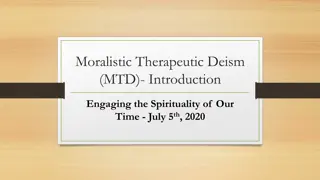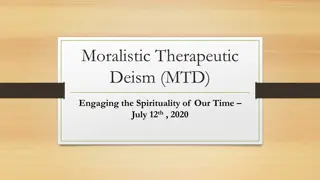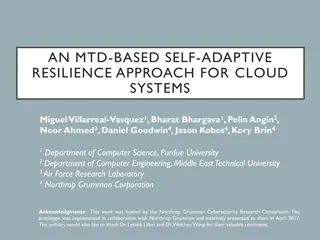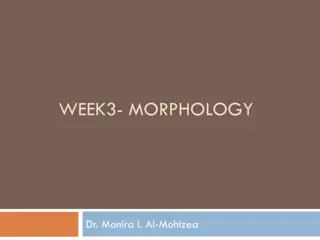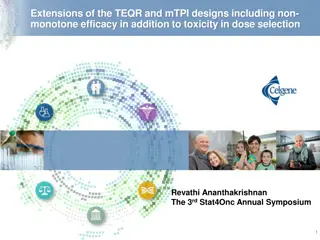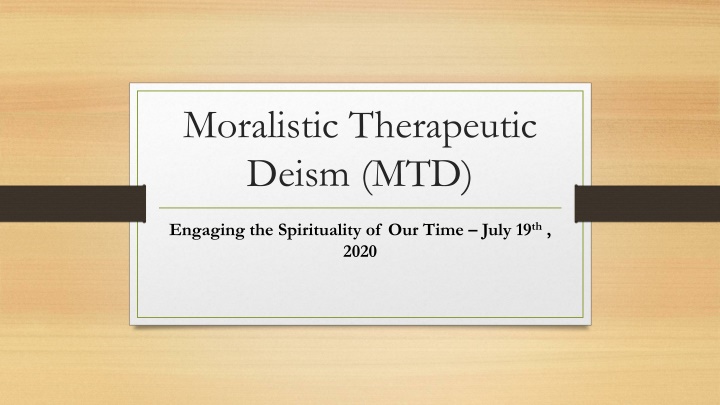
Moralistic Therapeutic Deism (MTD) in Modern Spirituality
Explore the concept of Moralistic Therapeutic Deism (MTD), its core beliefs, theological implications, and impact on individualism in contemporary American culture. Delve into the study of God and anthropology to grasp the foundations and influences of MTD in today's society.
Download Presentation

Please find below an Image/Link to download the presentation.
The content on the website is provided AS IS for your information and personal use only. It may not be sold, licensed, or shared on other websites without obtaining consent from the author. If you encounter any issues during the download, it is possible that the publisher has removed the file from their server.
You are allowed to download the files provided on this website for personal or commercial use, subject to the condition that they are used lawfully. All files are the property of their respective owners.
The content on the website is provided AS IS for your information and personal use only. It may not be sold, licensed, or shared on other websites without obtaining consent from the author.
E N D
Presentation Transcript
Moralistic Therapeutic Deism (MTD) Engaging the Spirituality of Our Time July 19th, 2020
MTD Class Outline July 5th: Introduction July 12th: Deism/Theism July 19th: Moralistic July 26th: Therapeutic
MTD: Core Beliefs (gotquestions.org) 1. A god exists who created and ordered the world and watches over human life on earth. (DEISM) 2. God wants people to be good, nice, and fair to each other, as taught in the Bible and by most world religions. (MORALISTIC) 3. The central goal of life is to be happy and to feel good about oneself. (THERAPEUTIC) 4. God does not need to be particularly involved in one s life except when God is needed to resolve a problem. (DEISM & THERAPEUTIC) 5. Good people go to heaven when they die. (MORALISTIC)
Romans 3:21-26 21But now apart from the law the righteousness of God has been made known, to which the Law and the Prophets testify.22This righteousness is given through faith in[h]Jesus Christ to all who believe. There is no difference between Jew and Gentile,23for all have sinned and fall short of the glory of God,24and all are justified freely by his grace through the redemption that came by Christ Jesus.25God presented Christ as a sacrifice of atonement,[i]through the shedding of his blood to be received by faith. He did this to demonstrate his righteousness, because in his forbearance he had left the sins committed beforehand unpunished 26he did it to demonstrate his righteousness at the present time, so as to be just and the one who justifies those who have faith in Jesus.
MTD Theology: The study of God John Stott: Most of our problems arise and seem insoluble because our image of God is distorted Who is this God that we worship? Countering MTD and understanding the Gospel will only make sense if we have an accurate image of God as he is revealed in scripture The deism/theism is the foundational problem that logically leads to the moralistic and therapeutic components of MTD Anthropology: is the study of people, past and present, with a focus on understanding the human condition both culturally and biologically. Who are we? What are we like? Are we basically good or sinful? A rejection of our sinful nature in the context of a theistic or deistic understanding of God logically leads to a moralistic (legalistic) and therapeutic religion.
MTD- Individualism In the end, this study indicates that American teenagers are heavily influenced by the ideology of individualism that has so profoundly shaped the larger culture. This bleeds over into a reflexive non-judgmentalism and a reluctance to suggest that anyone might actually be wrong in matters of faith and belief. - Albert Mohler
MTD- Individualism Roberta Bellah Habits of the Heart: We believe in the dignity, indeed the sacredness, of the individual. Anything that would violate our right to think for ourselves, judge for ourselves, make our own decisions, live our lives as we see fit, is not only morally wrong, it is sacrilegious. Our highest and noblest aspirations, not only for ourselves, but for those we care about, for our society and for the world, are closely linked to our individualism.
MTD: Expressive Individualism (EI)- Trevin Wax When defining expressive individualism, it might be best to start with the slogans behind the movement: You be you. Be true to yourself. Follow your heart. Find yourself. https://www.thegospelcoalition.org/blogs/trevin-wax/expressive-individualism- what-is-it/
MTD: Expressive Individualism Yuval Levin in The Fractured Republic describes it well: That term suggests not only a desire to pursue one s own path but also a yearning for fulfillment through the definition and articulation of one s own identity. It is a drive both to be more like whatever you already are and also to live in society by fully asserting who you are. The capacity of individuals to define the terms of their own existence by defining their personal identities is increasingly equated with liberty and with the meaning of some of our basic rights, and it is given pride of place in our self-understanding. https://www.thegospelcoalition.org/blogs/trevin-wax/expressive-individualism- what-is-it/
MTD: Expressive Individualism Charles Taylor: I mean the understanding of life which emerges with the Romantic expressivism of the late-eighteenth century, that each one of us has his/her own way of realizing our humanity, and that it is important to find and live out one s own, as against surrendering to conformity with a model imposed on us from outside, by society, or the previous generation, or religious or political authority.
MTD: Expressive Individualism- Trevin Wax For a society awash in expressive individualism, the greatest commandment is to be yourself and the second is like it: to affirm and applaud whatever self your neighbor chooses to be. The greatest sins, then, are to deny yourself or to question or judge someone else s self-expression. This radical redefining of sin leads many people who still sense the need for a moral ballast or spiritual dimension to pull away from historic Christianity and toward a more generic kind of inspiration. https://www.thegospelcoalition.org/blogs/trevin-wax/expressive-individualism- sin/
MTD: Expressive Individualism Trevin Wax: The first reason why expressive individualism poses a challenge is that we ve been commissioned to proclaim a message that is radically God-centered. The gospel challenges the Me with I Am the One who created and sustains us. Expressive individualism would have us look deep into our hearts to discover our inner essence and express that to the world. But the gospel shows how the depths of our hearts are steeped in sin; it claims that what we need most is not expression, but redemption
MTD- Moralistic Christian Smith and Melinda Lundquist Denton explained, Moralistic Therapeutic Deism "is about inculcating a moralistic approach to life. It teaches that central to living a good and happy life is being a good, moral person. That means being nice, kind, pleasant, respectful, responsible, at work on self-improvement, taking care of one's health, and doing one's best to be successful."
MTD- Moralistic Dwight Longenecker: Moralistic in replacing vital sacramental, evangelizing Christianity with a set of rules and regulations. Different sets of rules and regulations exist for different subsets. For a smart suburban congregation, the rules might be those of respectability and good manners. For a liberal, socially aware or hipster group the rules might be all about ecology, the right attitude on human rights issues and the right political stance. For a conservative Christian group the rules would be focused on sexual morality, modesty and the right religious devotions. While none of the rules and regulations are necessarily wrong, the error is in mistaking the rules and regulations for real religion.
MTD: Moralistic high value on being good & nice. Of course the idea of good in MTD is not defined by Scripture or God s moral law but according to my own sense (EI) of what is wrong or good The good shifts based on what the culture is promoting as good. So my sense of what is good will be intensely shaped by the current culture (peers, work, school, media & entertainment) and it s discipling of my heart. One of the challenges is that what is currently deemed as good is frequently called sinful according to Scripture.
Gospel vs MTD- Romans 3: 21-26 21But now apart from the law the righteousness of God has been made known, to which the Law and the Prophets testify.22This righteousness is given through faith in[h]Jesus Christ to all who believe. There is no difference between Jew and Gentile,23for all have sinned and fall short of the glory of God,24and all are justified freely by his grace through the redemption that came by Christ Jesus.25God presented Christ as a sacrifice of atonement,[i]through the shedding of his blood to be received by faith. He did this to demonstrate his righteousness, because in his forbearance he had left the sins committed beforehand unpunished 26he did it to demonstrate his righteousness at the present time, so as to be just and the one who justifies those who have faith in Jesus.
Gospel vs MTD: Romans 7:18-20; 24-25 18For I know that good itself does not dwell in me, that is, in my sinful nature.[c]For I have the desire to do what is good, but I cannot carry it out.19For I do not do the good I want to do, but the evil I do not want to do this I keep on doing.20Now if I do what I do not want to do, it is no longer I who do it, but it is sin living in me that does it. 24What a wretched man I am! Who will rescue me from this body that is subject to death?25Thanks be to God, who delivers me through Jesus Christ our Lord!




